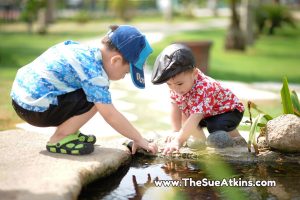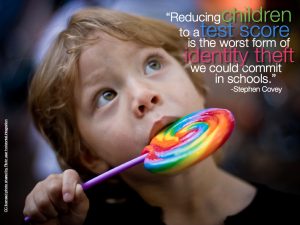


Like it? Share it!

Between schoolwork, homework, data driven school learning, standardised tests, exam anxiety, after-school activities and bullying, kids are super stressed out.
The foundations & most important and valuable learning happens in the early years of our children’s lives. The experiences that they have then shape their physical, mental and emotional wellbeing and how they think about themselves and others. Healthy, happy and caring societies are built upon healthy, happy and connected children.
‘Connection’ is an important part but just one of the four Crucial ‘C’s*.’ The Blueprint for Raising Happy, Confident, Resilient Children. Read my article here.
Children today spend more hours per day, more days per year, and more years of their life in school than ever before. More weight is given to tests and grades than ever before. Outside of school, children spend more time than ever in settings in which they are directed, protected, catered to, ranked, judged, and rewarded by adults. In all of these settings adults are in control, not children.
As a former Deputy Head & Class Teacher for over 25 years, I agree with an increasing number of early years experts in the UK (and worldwide) who are expressing concern about current policymaking and the impact that this is having on a young child’s wellbeing. They argue that measures of testing and accountability are consistently being put before the best interests of the child – and that young children in the UK deserve something better.
As an author I am passionate about parenting and whilst politicians and policy makers argue it out I wonder what you can do as a parent to help take the pressure off your child & to avoid rushing them through their childhood?
What can you do to alleviate the stress and pressure your children are experiencing?
Can you be brave enough to not rush your child into sitting at a desk & holding a pencil too soon?
Can you make a conscious decision to allow your children, regardless of their age to play more?
How can you support their learning free from ‘pushing?’
How can you encourage, nurture and foster a life long love of learning through allowing your child’s natural curiosity to lead the way?
How can you hold the space at home for your child to be little and enjoy childhood free from League Tables and formal learning too soon?

Raising happy, confident, resilient children is rather more than just prioritising what tests they can pass or grades they can achieve.
As parents the best gift you can give your child is to nurture the kind of people and adults you want them to become.
One of the first places I start with parents that I coach is to ask them what core values they want their child to grow up with.
The key ones are usually kindness, respect, tolerance, patience, hardworking, happy.
After years of working with family’s happiness ALWAYS tops the list.
We all want our children to do well. To achieve their true potential and to be the best version of themselves that they can be. But subjecting them to a narrow view of academic learning too soon is too narrow a focus and is actually not in tune with the modern way of living or learning.
An over-early focus on acquiring knowledge and skills, rather than social values, relationships & friendships, runs the risk of undermining & damaging your child’s ability to become a well rounded adult.
You can’t miss out or rush through steps of development and expect a child to thrive emotionally.
There is a correlation between children’s freedom to play, explore on their own (independent of direct adult guidance) & children’s wellbeing. Free play and exploration are, historically, the means by which children learn to solve their own problems, control their own lives, develop their own interests, and become competent in pursuit of their own interests. This ability to play has been slowly, but surely, being eroded in schools.
I even know of a school locally where Wet Play has to be ‘meaningful’ so colouring in and just chilling out is discouraged. Wet Play videos have been banned unless they are ‘educational’ ?
So, my challenge to you as parents is to redress that balance & to be the antidote to that pressure to perform by being confident in your decision to let your children relax at home.
Do things for fun ‘just because.’ Let your kids build a den in the sitting room, play in the garden, ride a bike or read a book.
Pause to Ponder
‘By depriving children of opportunities to play on their own, away from direct adult supervision and control, we are depriving them of opportunities to learn how to take control of their own lives. We may think we are protecting them, but in fact we are diminishing their joy, diminishing their sense of self-control, preventing them from discovering and exploring the endeavours they would most love, and increasing the odds that they will suffer from anxiety, depression, and other disorders.’ ~ Peter Gray on his Psychology Today Blog.
Parents don’t always understand the importance of play and in today’s competitive world, the temptation is to stop your children “wasting time” and to put the time to what they believe is more constructive use.
For a child, however, there is no more constructive activity than play. When analysing the importance of play, particularly if you’re tempted to introduce a more “worthwhile” activity such as flash cards, educational computer games or dancing or karate lessons, you should take into account the following points:
Be the balance in your child’s life to the data driven stressful pressure of school & never underestimate the importance of play whatever your kid’s ages.
*References to:
B.L. Bettner and A. Lew (1989, 2005), Raising Kids Who Can, Newton Centre, MA: Connexions Press.
Dr. Rudoph Dreikers Children: The Challenge” (Plume)
Alfred Adler Individual Psychology Harper Collins
Discussing every possible aspect of parenting, giving you advice and support on topics which affect your daily life. Each free, weekly episode is bursting with practical tips, techniques and ideas.
I will teach you my no-nonsense, simple techniques & give you hundreds of my expert parenting articles, videos & podcasts so you can get back to the business of having fun with your family!



